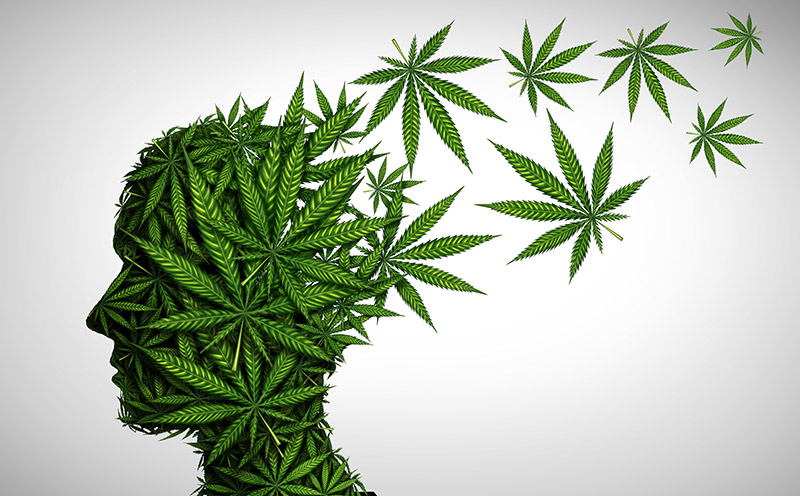Cannabis Addiction & Abuse
Cannabis is one of the most widely known and socially accepted drugs in the world. Because cannabis is legal as a medical prescription, it has become more readily accessible, which makes it difficult for individuals managing an addiction, to overcome. We look at what a cannabis addiction is, the dangers of its use, and how to find the help you need to quit cannabis.
- What is Cannabis Addiction?
- Cannabis Addiction VS. Abuse
- What Makes Cannabis Addictive?
- Synthetic Cannabis (Spice)
- How Cannabis Addiction Develops
- Signs & Symptoms of Cannabis Addiction
- The Dangers of Cannabis Addiction
- Cannabis Use in Teens
- Cannabis Use in Pregnancy
- Getting Help for Cannabis Addiction
- Frequently Asked Questions
What is Cannabis Addiction?
Cannabis use can lead to a cannabis use disorder. Cannabis is also known as marijuana, weed, skunk, green, blunt, pot, hash, spliff, hashish, puff, ganga, etc. Individuals who regularly use the substance whether in vape, oil or smoke form, are more likely to develop substance dependence. In the UK, cannabis is currently a class B controlled substance which means that it can be sought by prescription but cannot be individually grown, sold, or distributed without a license.
According to recent studies, up to 30% of people who use cannabis will develop a substance use disorder (NIDA, 2020). Addiction or dependence occurs when an individual starts to feel withdrawal symptoms when they stop taking it or reduce the amount of substance used. Cravings, difficulty sustaining concentration, mood disruptions, and physical symptoms all occur after stopping cannabis use.

Why is Cannabis Popular?
As countries including various states across the US move forward with the legalisation of cannabis, the drug is not only growing in popularity but becoming widely accepted for recreational and social purposes. Along with its glamorisation across popular media, movies and television shows, the decriminalisation of cannabis is rife. Although the UK has classified the drug under category B, it is primarily used for medicinal purposes and strict legalities remain around its private use and cultivation. (Drugwise).

Is Cannabis Dangerous?
The regular use of cannabis can lead to a multitude of mental and physical health problems. The most common physical effects resulting from cannabis use include rapid heart rate, fatigue, dizziness, reduced blood pressure, bloodshot eyes. Mentally cannabis can also impact memory, perception, and increase feelings of anxiousness or depression. Cannabis is often used in combination with drugs such as heroin and ecstasy to enhance its mood stimulating and hallucinating effects.
Most commonly tobacco and cannabis are smoked in joints which increases the risk of developing tobacco and cannabis dependence disorders (Psychopharmacology). According to Psychopharmacology, very few studies have been completed on the interaction between cannabis and tobacco and whether these substances contribute to higher rates of dependence.
When cannabis is regularly ingested, particularly in higher doses, it impedes one’s ability to maintain socially, morally, and physically responsible behaviours. Owing to its intoxicating effects, short term memory compromises focus while distortions in perception make it difficult to maintain healthy relationships or focus at work. Cannabis dependence will negatively influence your life negatively. Fortunately, you can find help and a means to cope with the grip of addiction.
Cannabis Addiction VS. Abuse
Cannabis remains the most commonly used illicit drug in the world. Addiction Center claims that cannabis causes psychoactivity and changes in perception owing to the chemical compound THC (tetrahydrocannabinol). The scale of intensity will differ from one individual to the next; however, cannabis abuse is the use of the substance in which a short-term high is achieved. By smoking, vaping, or consuming, its effects range from feelings of elation and relaxation to increased appetite and a reduction in anxiety. Individuals are able to stop using without experiencing severe withdrawal symptoms.
Cannabis addiction is characterized by a psychological dependence on the substance with a negative impact on health, relationships, work-life, and general well-being. With higher levels of THC in newly cultivated plants, there is a higher risk of abuse and tolerance. Addiction to cannabis includes an inability to stop using and the experience of withdrawal with a reduction in use.
One can smoke a joint recreationally and continue to function in individual and professional life without the need to use. Addiction is where an individual depends on cannabis to reduce feel better, to manage emotions or pain, without an ability to stop using or to reduce the amount of cannabis being used.
What Makes Cannabis Addictive?
THC works by blocking the natural activity of the brain’s neurotransmitters. Over time, the body stops producing these neurotransmitters and the brain requires the use of cannabis to achieve balance. When THC is no longer used, the body will crave it and withdrawal symptoms become apparent. When withdrawal and an inability to quit using are experienced, this is considered a cannabis addiction.
Synthetic Cannabis (Spice)
The introduction of a synthetic cannabinoid called Spice has increased serious illnesses and hospital admissions in the UK. Artificial psychoactive chemicals are applied to plant material and either smoked or vaped, known to influence the brain more powerfully than traditional cannabis (NIDA). Spice or fake weed is not a safe substance to use.
Cannabis Oils and Vape Pens
Cannabis oil is derived from the cannabis plant and ingested in the form of a dropper. It is consumed or it is applied to the skin as a hydrating solution. Vape pens are growing in popularity and include ingesting the cannabis compound through an e-cigarette or similar device.
Cannabis Consumables
Cannabis consumables are highly sought after among prescription users but also recreationally. It allows for the easier ingestion of the compound without the risk of odours and without the need to smoke or vape the compound.
Examples of cannabis consumables or edibles include gummy sweets, hash brownies, and a variety of teas.
Enter your phone number below and one of our qualified addiction specialists will get in touch to discuss your options.

How Cannabis Addiction Develops
For many years cannabis has been known and used for its medicinal properties, but why do some people become addicted and others not? According to Healthline, individuals who use cannabis before age 18 are 7 times more likely to develop an addiction. Let’s look at how cannabis addiction develops.
Repeat Exposure
The process of repeat exposure includes repeated use of cannabis, perhaps smoked socially in a joint, and then the continued use of the substance over time. It creates a pleasure connection between the brain and the body but more importantly creates tolerance. The more you use, the more you need to achieve the same “high” or intoxication. This can lead to an addiction.
Trauma & Pre-existing Mental Health Conditions
Mental health, trauma, and cannabis addiction play an important role in developing an addiction to cannabis (Healthline). Depression, anxiety, panic disorders, low self-esteem, and poor relationships are all commonly associated with cannabis use. THC in cannabis creates the psychological experience of intoxication, which also influences the brain’s feel-good hormone, dopamine. As individuals experience the state of a “high” there is an escape from previous trauma, emotional and psychological instability.
Mood disorders are highly associated with cannabis use and dependence. Cannabis also induces mood instabilities and activates genetic mood vulnerabilities.
Where an addiction to cannabis and an underlying mental health disorder exists, this creates a dual diagnosis. The addiction and the psychological condition must be treated for successful outcomes.
A Family History of Cannabis Use
Studies concerning the use of cannabis and a genetic component have found a strong correlation between fraternal twins becoming dependent on cannabis. More recently, the link between both genetic and environmental factors play a significant role in the development of substance dependence.
In many family environments, where individuals are raised as less socially connected or without meaningful relationships, there is also a greater tendency to develop cannabis addiction.
Signs & Symptoms of Cannabis Addiction
A major sign of cannabis addiction is an inability to reduce or quit using cannabis regardless of the consequences. Whether this means getting high on the job or having to use to feel “normal,” individuals with a cannabis dependence will continue to use to get “high.”
A cannabis addiction and frequent use include the following signs:
- Mood disturbances or irritability
- Cravings
- Depression
- Poor sleeping patterns
- Increased appetite
- General restlessness
- Anxiety.
Diagnosing Cannabis Addiction
The DSM 5 outlines the criteria for diagnosing a drug addiction (J. Flowers Health institute). It consists of 11 criteria within which the presence and the severity o the drug dependence are determined. A common Drug Abuse Screening Test (DAST) is used to evaluate the presence of cannabis addiction. The questionnaire involves yes/no questions from its influence at work to trying to quit using (J. Flowers Health Institute).
The Dangers of Cannabis Addiction
Cannabis addiction can cause long-term structural changes in the brain (WebMD). The use of cannabis leads to an intoxication owing to the compound, THC. While some people feel relaxed and happy, others feel panicked, anxious, and even depressed under the influence of cannabis. In high doses, you may hallucinate or feel paranoid as your perception becomes distorted.
Physically, intoxication by cannabis lowers your inhibitions which risks harmful behaviours, compromises your dexterity, and affects your motor skills which risk safe driving.

Cannabis Use in Teens
Cannabis among teens is on the rise. Owing to its popularity across media, and its legalization in certain countries, more teenagers are trying cannabis in close-knit social circles. Cannabis use among teens increases the risk of difficulties at school, risk of sexual activity, use of drugs or alcohol, suicidal thoughts, and mood imbalances (AACAP). Children who smoke cannabis are also more likely to develop problems as an adult.
Cannabis Use in Pregnancy
Healthline reveals that up to 28% of pregnant women in urban environments use cannabis. There is a high risk of complications throughout the pregnancy with the use of pot or hash, but also the following risks to the foetus:
- Underweight at birth
- Premature birth
- Shorter length than the average foetus
- Small head circumference
- Possible stillbirth.
Researchers state that the prolonged use of THC during and after pregnancy will lead to a negative impact of foetal brain development. Recent studies further show that children born to a cannabis dependent mother are more likely to show learning difficulties, poor impulse control, and an inability to sustain attention.
Cannabis Use and Employment
Cannabis addictions lead to the regular use of the substance whether in a social setting, in private, or at work. Individuals who are substance dependent need to use cannabis to feel normal and stable owing to chemical changes within the brain. The misuse of cannabis leads to poor cognitive function and a lack of motivation, compromising productivity and the future of one’s career.

Getting Help for Cannabis Addiction
If you are struggling with an addiction to cannabis, help is available through both inpatient and outpatient services. Outpatient services are offered through NHS services in which individuals will undergo a medically supervised detox and undergo the process of therapy while staying connected to loved ones, and without attending a full-time rehabilitation centre.
An inpatient service is provided for severe substance addiction. Again, a medically assisted detox is facilitated but individuals will remain at the facility for the duration of treatment. Therapy can last between 30 and 90 days.
When you seek help for cannabis addiction, you will receive a supported detox by friendly medical staff including addiction counselling, and support groups such as NA and CA.
If you wish to learn more about the next steps, please feel free to contact us. We are here to help you act to overcome an addiction.
